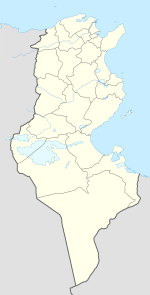Dougga
Dougga (Dougga Nouvelle; from Central Atlas Tamazight ⵜⵓⴳⴳⴰ Tugga , Arabic دقة, DMG Duqa ) is a place in the Tunisian governorate of Beja south of the city of Téboursouk . It is 520 to 600 m above sea level.
The Arabic Dougga is the direct successor settlement of the Numidian-Roman city of Thugga. Until the first half of the 20th century, the modern village was in the area of the ancient city. As part of the archaeological excavations, however, the inhabitants of Dougga were gradually relocated to the valley of the Oued Khalled, where a new settlement was built a few kilometers east of the ancient city on the road from Téboursouk to Le Kef .
Located in a landscape of meadows and olive groves on the edge of the Monts Teboursouk, the Ain Mizeh spring, which is still in use today, is located near the ancient city. The place has a mosque, a hammam, two cafes, a few small shops and a medical station.
Ancient ruined city
Today's Dougga is mainly characterized by the ruins of the ancient city of Thugga , which dates back to the 4th century BC. Was founded by the Numidians .
Since 1997 a 25 hectare site with ruins of Thugga has been declared a World Heritage Site. The Roman theater offered 2,500 seats in a semicircle. From the place of the wind rose it goes to the market, to the Capitol and the thermal baths. The Alexander Severus Arch is well preserved . Ruins of a church bear witness to the early spread of Christianity.
The Comedie Francaise regularly performs Greek dramas in the Dougga theater.





